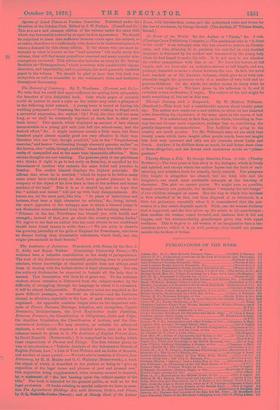The Institutes of Justinian. Translated, with Notes, by the Rev.
J. T. Abdy and Bryan Walker. (Cambridge University Press.)—We welcome here a valuable contribution to the study of jurisprudence. The text of the Institutes is occasionally perplexing, even to practised scholars, whose knowledge of classical models does not always avail them in dealing with the technicalities of legal phraseology. Nor can the ordinary dictionaries be expected to furnish all the help that is wanted. This translation will then be of great use. To the ordinary student, whose attention is distracted from the subject-matter by the difficulty of struggling through the language in which it is contained. it will be almost indispensable. Explanatory notes are supplied at the more difficult passages, or wherever an allusion—and the Institutes abound in allusions, especially to the leges of past times—needs to be explained. An appendix contains longer notes on the important sub- jects of Patria Potestas, Marriage, Adoption, and Arrogation, Capitis Deminutio, Disinheritance, the Civil Magistrates under Justinian, Bonorum Possessio, the Classification of Obligations, Doles and Culpa, the Aquilian Stipulation, the Classification of Actions, and the Con- currence of Actions.—We may mention, as suitable for advanced students, a work which requires a detailed notice, such as in these columns cannot be given to it, The Institutes of English Private Law, by David Nesmith. (Butterworth.) It is comprised in two books, which treat respectively of Persons and Things. The first volume gives, by way of introduction, a "Tabular Analysis of the Substantive Branch of English Private Law," a List of Text-Writers, and an Index of Reports, and another of cases quoted.--We have also to mention A Concise Law Dictionary, by H. M. Morley and G. C. Whiteley (Butterworth), a work the object of which is described in the preface as being to "give an exposition of the legal terms and phrases of past and present use," this exposition being supplemented, when occasion seemed to demand, fly _a _statement, of " the law bearing upor the subject-matter of the title." The book is intended for the general public, as well as for the legal profession. Of books relating to special subjects we have to men- tion The Agricultural Holdings Act, with Statutes, Orders, and Forms, by C. L. Radcliffe Cooke. (Sweet); and A. Bandy Book of the Labour Laws, with introduction, notes, and the authorised rules and forma for the use of workmen, by George Howell. (The Author, 27 Villiers Street, Strand.)


































 Previous page
Previous page